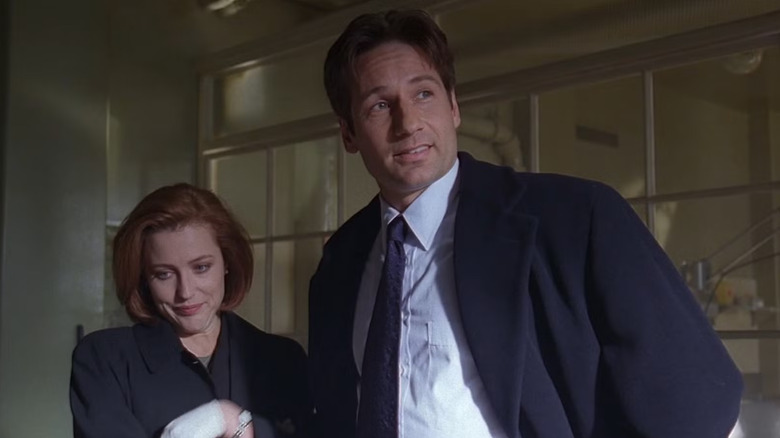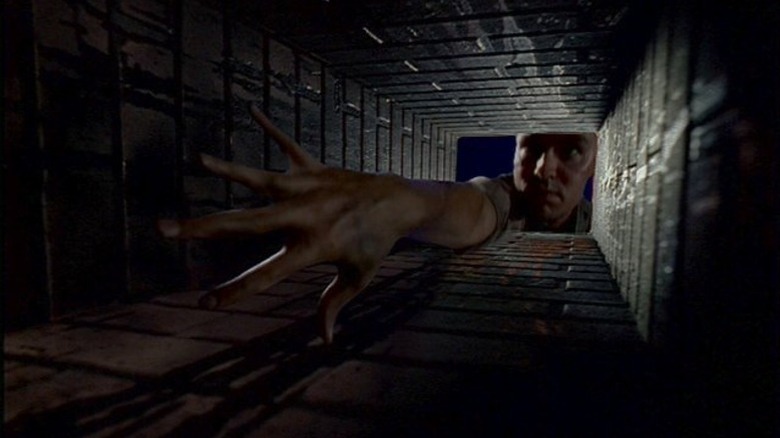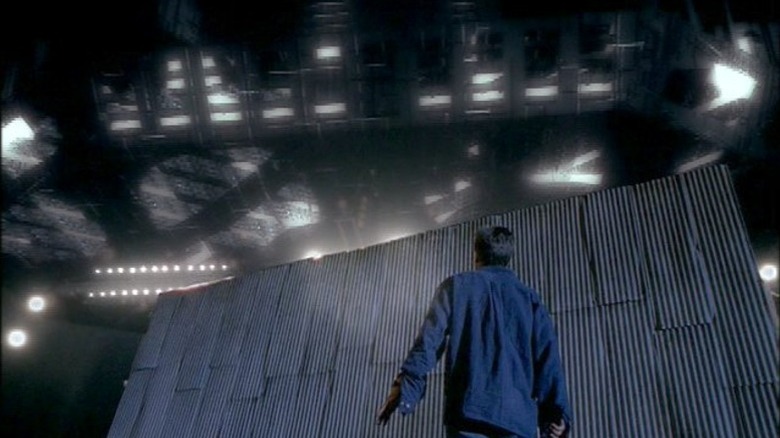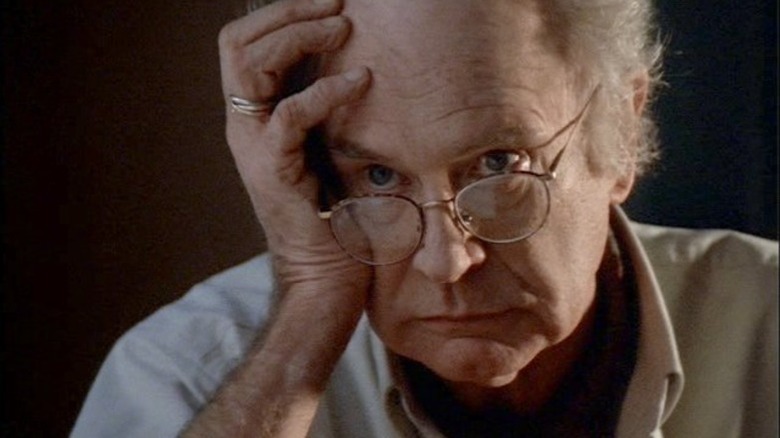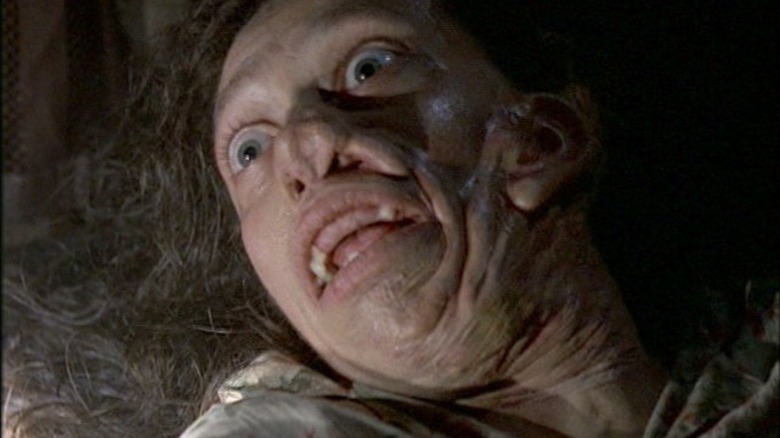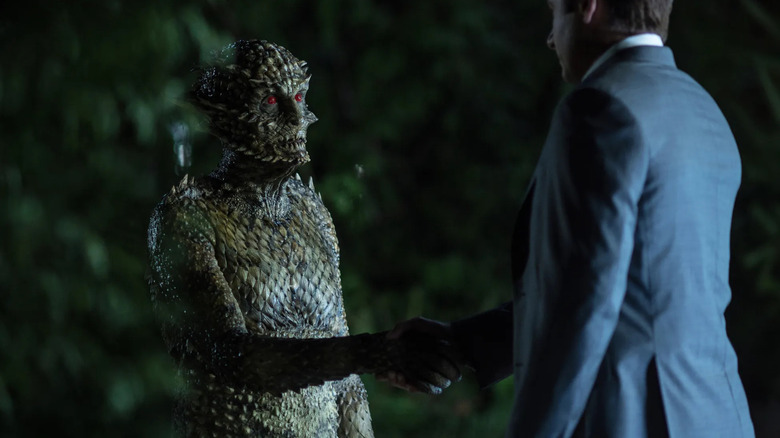5 Essential The X-Files Episodes Everyone Should Watch At Least Once
Chris Carter's paranormal mystery series "The X-Files" wasn't just one of the best TV shows of the 1990s, but it came to define the era. "The X-Files" was produced after the end of the Cold War, and while the United States was enjoying a new period of seeming economic prosperity and eerie international peace. This period, however, made many of us suspicious. Rather than focus our enmity on mysterious foes overseas, we turned inward, looking at our own institutions with suspicion. The FBI's malfeasance became a point of interest, and "The X-Files" posited that the world was rife with aliens, cryptids, and vampires ... and that the FBI spends considerable resources hiding them from the public.
Agent Mulder (David Duchovny) was the open-minded explorer, wanting to find the truth about the world, wounded from when his sister was abducted by aliens. Agent Scully (Gillian Anderson) was the skeptic, always insisting that there is a logical, scientific reason that something may look supernatural. Scully retained her skepticism, even after seeing weird creatures with Mulder every week. The series was funereal in tone and intellectual in presentation. It was sensational and smart at the same time.
But just as the 1990s eventually came to an end, "The X-Files" lost its relevance. It was a reflection of the time. After the beginning of the George W. Bush administration, its wee alien conspiracies suddenly seemed naïve. "The X-Files" had no place in the world anymore. It's no wonder that the world's many X-Philes dislike all the show's seasons that aired after 2000. I say declaratively that seasons 7 through 11 are not essential. Well, with one exception, as we'll see below. H
ere are the five most essential episodes of "The X-Files." Note: this will not merely be a list of the "funny" episodes. Fans like those best, of course, but the below selections are more generally emblematic of what the series is capable of.
Squeeze (Season 1, Episode 3)
The bulk of "The X-Files" consisted of monster-of-the-week episodes, wherein Mulder and Scully would investigate a creature, supernatural killer, or some other fantastical beast. This stood in contrast to the "arc" episodes, wherein the stalwart FBI agents would further look into an ever-widening conspiracy within the government to hide aliens, technology, and evidence of mass abductions. Different X-Philes prefer different types of episodes.
As for monster-of-the-week episodes, though, "The X-Files" came out swinging with "Squeeze" (September 24, 1993), the third episode of the series. The story followed a mysterious man named Eugene Victor Tooms (Doug Hutchison), a Baltimoran with the mysterious ability to stretch and squeeze his body through tiny openings. He used this ability to slide through air vents and attack people, killing them and removing their livers. Mulder and Scully manage to apprehend Tooms and give him a polygraph test, linking him to murders from nearly a century before.
It's eventually revealed that Tooms is not a human, but some other kind of humanoid creature that hibernates in a subterranean nest for 30-year periods. It only awakens to rebuild its next, eat a few human livers, and go back to sleep. Tooms is a scary monster with a unique ability, and showed that "The X-Files" wasn't going to rely on traditional cryptids like Bigfoot or the Loch Ness Monster. It was fully willing to be scary and gross on its own terms. If the first two episodes didn't grab you, then "Squeeze" assured you would become an "X-Files" addict for years to come.
Paper Clip (Season 3, Episode 2)
On the conspiracy side of the coin, we have "Paper Clip" (September 29, 1995), which is also one of the best episodes of the series. "Paper Clip" was the third part of a three-episode arc that also included "Anasazi" and "The Blessing Way," and it opened up the show's third season with a bang. This three-episode arc was also a sequel story of sorts to a two-parter from the show's second season that included "Duane Barry" and "Ascension" (October 14 and 21, 1994). Really, this spot is a five-way tie between those episodes.
In 1994, Gillian Anderson became pregnant and needed to step away from the series for a spell. Show creator Chris Carter came up with an arc wherein Scully was kidnapped, leaving Mulder on his own. That last-minute cover ended up inspiring a larger story arc about a deep conspiracy in the FBI, which may have proven the existence of alien greys, and how the U.S. government was secretly using alien technology. Several new players were introduced along the way, including the Cigarette Smoking Man (William B. Davis), the Lone Gunmen (Bruce Harwood, Tom Braidwood, Dean Haglund), and a cadre of shadowy conspirators called the Syndicate. Oh yes, and there was the weaselly Agent Krycek (Nicholas Lea), whom some X-Philes referred to as Ratboy. The title of "Paper Clip" refers to the real-life Project Paperclip, wherein multiple Nazi scientists were hired by the U.S. government after World War II.
Getting into the details of the story would take too long, as the conspiracies on "The X-Files" were massively complex and always changing. But at this point in the series, the conspiracies were still comprehensible and seemed large and important. "Paper Clip" was proof that "The X-Files" could work with larger, outsize stories that felt incredibly important and salient. Until the 1998 movie, the conspiracy episodes wouldn't get much better than this.
Jose Chung's From Outer Space (Season 3, Episode 20)
"Jose Chung's 'From Outer Space'" (April 12, 1996) might have been the first proper "comedy" episode of "The X-Files." In it, the immortal Charles Nelson Reilly played the titular Jose Chung, an author who is writing a book about alien abductions. He interviews Scully about a recent case of hers, and finds that her job can be a little kooky from time to time. Jose also interviews a few other assorted kooks and diner owners, and finds that Mulder and Scully appear, from the outside, to be part of the shadowy conspiracies they fight against. This is the episode wherein Scully performs an alien autopsy only to find that she's dissecting an alien suit being worn by a very human military pilot.
This is also the episode wherein Alex Trebek and Jesse Ventura appear as mysterious Men in Black, and Mulder is said to screech like an alien when he sees a crashed UFO. It's the episode where an alien abductee, while being held in a cage on an alien spacecraft, looks over into the cell next to them and sees another alien, locked up, smoking a cigarette and repeating, "This is not happening." The gag is that Jose Chung wished to publish his book about alien abduction, aiming to blow the lid off all the conspiracies. But, it seems, the business of alien abduction is so whimsical and absurd that its publication would discredit the actual investigators of UFOlogy.
"Jose Chung's 'From Outer Space'" cleverly makes light of "The X-Files," openly acknowledging that the complex conspiracies on the show will sound oblique and ridiculous to any outsiders. Mulder may have been trying to uncover the truth, but the truth is "out there" in both senses of the phrase.
Home (Season 4, Episode 2)
"Home" (October 11, 1996) is another monster-of-the-week episode, but it may be the show's creepiest and most effective. Mulder and Scully travel to Home, Pennsylvania, to investigate the exhumed corpse of a severely mutated infant found buried in a baseball park. Mulder suspects that the infant's death might have something to do with the mutated Peacock brothers who live nearby. The Peacocks have been living in the same house since the Civil War, and it's implied that the family has stuck to a strict regimen of inbreeding that entire time. Mulder and Scully investigate whether the Peacock brothers may have kidnapped and impregnated a victim. If they did, they need to find her. The episode would climax inside the Peacock household, and the identity of the baby's mother revealed to be a member of the Peacock family. Eesh.
"Home" has the same sort of villains as Tobe Hooper's "The Texas Chain Saw Massacre" from over 20 years earlier, but told in an "X-Files" way, with a deep conspiracy and a need to find the truth. When Mulder and Scully find what they find underneath the Peacock Bros. bed, it's shocking and horrifying. It's not supernatural, but it certainly is unusual, and plays into decades of lurid urban legends about the backwater areas of the United States. "Home" doesn't uncover anything about the mythos of "The X-Files," but it proves that monsters of the week will always be the show's strongest suit. Have something lighthearted and fun to watch after "Home," because it may leave you a little shaken.
Mulder and Scully Meet the Were-Monster (Season 10, Episode 3)
This may be a controversial choice, as "Mulder and Scully Meet the Were-Monster" (February 1, 2016) aired during the poorly received two-season revival of "The X-Files" that aired in 2016 and in 2018. Time, as mentioned, was not kind to "The X-Files," and it was dated as soon as Bill Clinton left office. This didn't stop occasional re-visitations in the form of the feature film "The X-Files: I Want to Believe" in 2008, and the two revival season in the 2010s.
By then, Mulder and Scully had aged out, and audiences wondered what we were doing here. Real-world government conspiracies about torture, faked weapons reports, and ill-advised wars were more important than the fantasy aliens seen in the 1990s, so "The X-Files" was instantly behind-the-times. Only "Mulder and Scully Meet the Were-Monster" managed to address the nature of the FBI agents' work, and what function they still played decades after their glory days.
Rhys Darby plays an ordinary guy named Guy Mann who seems uncomfortable around other people. He is the suspect in a bloody murder, one that seems to have been perpetrated by a betoothed monster, or at least a human with a gore fetish. It's eventually revealed that Guy Mann is innocent ... and that he's not a human. It seems that Guy Mann is a bipedal lizard being who lived happily in the woods with vague animal intelligence. When he was bitten by a human, be became a were-human, now able to turn into a man for brief periods. Guy hates being human. He hates being self-aware. He hates that he has to concern himself with petty human concerns.
Mulder witnesses Guy transforming, giving him proof that the supernatural is out there. But, Mulder learns — as does the audience — that the monsters don't care about "the truth." They just want to live their lives. Maybe, Mulder didn't need to expose the truth. Maybe he can just let the monsters be.
